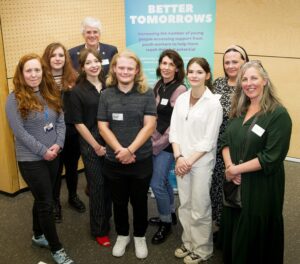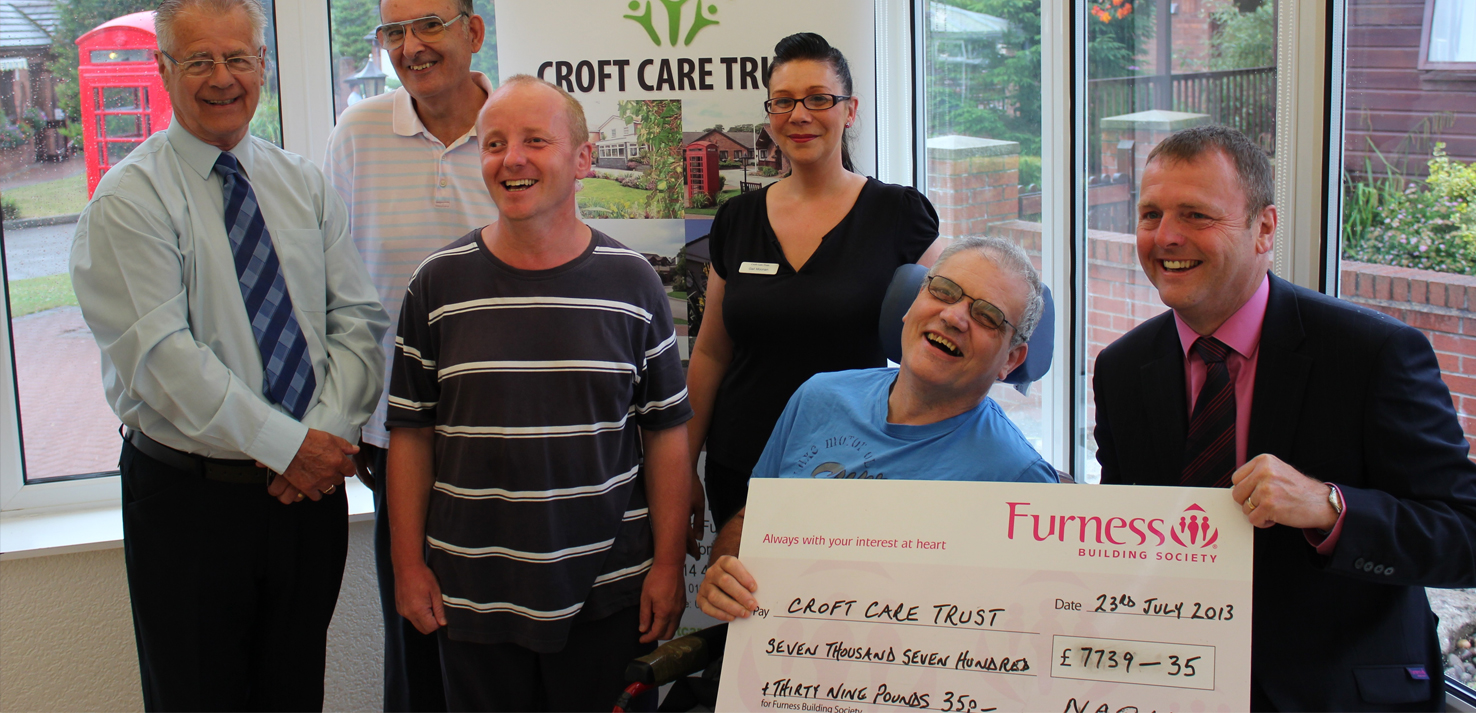Month: July 2023
Event celebrates success of young West Cumbrian entrepreneurs
Seven inspiring young West Cumbrians, who started their own businesses, have been praised for their nous and ingenuity. All seven took part in Positive Enterprise, an initiative from Cumbria Community Foundation and the Centre for Leadership Performance to help young people from Allerdale and Copeland go into business.
Their achievements were recognised at a celebratory event at Lakes College, Workington, to mark the end of the first year of the programme.
All participants, aged 15 to 25, have received a £1,000 grant, mentoring from an experienced businessperson and performance and leadership development.

He said: “I saw a gap in the market and it has been very successful. Positive Enterprise helped me take it from an idea to a business. The grant paid for equipment and the mentoring helped me find the best ways to sell the products and explore potential opportunities.”
Rachel McCartney, 24, of Holmrook, had the most ambitious idea. She has set up McCartney Sustainable Solutions to recycle food waste into compost, fertiliser and biofuel, and is in the process of raising £1.2m. She said: “In Cumbria, we are paying £100 a tonne to dispose of food waste in landfill. I thought there were better ways of dealing with it.”
Lennon Glass, 15, from Cockermouth, trades as Artify making customised and bespoke wool rugs. He said: “I do school work on weekdays and make rugs at the weekend. All the rugs are from UK-sourced wool and profits go to the WI.”
Bethany Goodall, 24, of Workington, established the Lake District Academy of Theatre Arts to provide affordable musical theatre workshops. She said: “Having one-to-one sessions with a mentor gave me a real insight into how to sell my idea. I wouldn’t have had the confidence to do that.”
Three of the participants could not be there in person but told their stories through pre-recorded presentations.
Josh Coombe, 15, from Whitehaven, used his grant to buy printing equipment for JC Stitch and Style, which offer fully customisable clothing and mugs.
Luke Eilbeck, 18, of Wigton, has set up Mad4Kit selling vintage secondhand football memorabilia while studying for his A-levels.
And Jack Fleming, 19, from Whitehaven, runs JF Entertainment, a mobile DJ service, which has expanded thanks to Positive Enterprise.
The guest speaker was Sally Phillips, founder of Chimney Sheep in Workington, which makes draught excluders from Herdwick wool. She offered advice and encouragement to the participants.
“I’ve always taken it one step at a time, and now I employ 14 people with a turnover of £2.2m,” Sally said. “It’s not always been fun and games, things do go wrong, but I just ride the wave. I hope you all have adventures as well.”

Cumbria Community Foundation hopes to repeat Positive Enterprise in 2024.
The programme is funded by the Cumbria-based property developer Brian Scowcroft with match funding from Sellafield Ltd as part of its Transforming West Cumbria programme, the Low Level Waste Repository Ltd (LLWR), Well Whitehaven, Morgan Sindall and Kaefer.
Samantha McKenzie, of Nuclear Waste Services, thought it money well spent. She said: “One of the priorities for the LLWR as a funder is to help young people to develop their skills and knowledge and to be the best they can be. Every single one of them has done that.”
And Laurie Crayston, an entrepreneur who acted as a mentor to Josh Coombe, said: “I like to think that I gave him useful pointers. Every issue he encountered was something I’d had to deal with my own business at some point.”
Better Tomorrows improves life chances of young Cumbrians
A new initiative to encourage more people into youth work in Cumbria has been hailed as a resounding success and is already transforming lives.
Better Tomorrows was launched by David Beeby, Chair of Cumbria Community Foundation and a former High Sheriff of Cumbria, to address what he describes as a “huge gap” in youth work provision.
In the first year of the three-year programme, over 30 people have participated in the accredited training, 19 organisations have been funded, providing 26 new youth worker roles and nearly 4,000 hours of new youth work has been delivered. You can read the first year evaluation here.

“We had conversations about what was missing and came across compelling evidence that quality youth work makes a real difference to the outcomes for young people, yet funding for youth work has been cut dramatically.
“It has been a privilege to try and do something about that. I hope now that youth work is being recognised as a career and as an opportunity.”
Better Tomorrows is investing more than £1 million over three years to pay for accredited youth work training. Alongside the training, which is delivered in-person by Cumbria Youth Alliance, it also offers multi-year grants up to £75,000 to community organisations that set up or provide new youth work opportunities for local people.
More than 70 people attended the celebratory event at the University of Cumbria’s Learning Gateway in Carlisle, a mix of funders, funded organisations and youth workers who have undergone training.
Over 40 funders have contributed to the programme, including the Community Foundation, Francis C Scott Trust, Four Acre Trust, LLWR, many local businesses and the Office of the Police, Fire and Crime Commissioner, which is contributing £75,000.

Mike Johnson, Deputy Police, Fire and Crime Commissioner, said: “High-quality youth work has a crucial role to play in supporting young people to achieve their potential. They gain confidence and competence, develop self-assurance, and can establish high expectations and aspirations for themselves. This is why it is vital that we provide qualified youth workers across Cumbria.”
The most powerful moment came when Erin Beaty and AJ Fell, two young people who regularly attend Carlisle Youth Zone, explained how youth work has changed their lives for the better.

AJ said: “Opportunities are coming left, right and centre for me now. I’m going to university to do music and that’s only because of the Youth Zone. I started music when a staff member there threw a guitar at me and said, ‘Learn that!’.”
Erin added: “I’ve made some of my closest friends through the Youth Zone. I couldn’t have met them anywhere else because we go to different schools.”
The organisations to have received support from Better Tomorrows include Euphoric Circus, a charity operating in Penrith, Appleby and Alston that engages with young people by training them in circus skills.
Development Officer Toni Spence said: “The funding has benefited us massively. It has formalised what we can offer in terms of training people in youth work and it has made the quality of what we deliver much higher.”
Another beneficiary is South Whitehaven Youth Partnership, which works with young people between the ages of eight and 18. Representative Jacq Carty said: “We’ve got three years of funding and, by the end of year one, we’ve been able to engage with an additional 107 young people as a result.”
Better Tomorrows is scalable, and it can make an even bigger difference with further funding. For more information, or to make a donation, click here or call 01900 825760.
Tackling tension around immigration in Barrow
Barrow is one of the most socio-economically deprived areas in Cumbria. It’s also home to a growing community of refugees and asylum seekers – like the rest of the UK, migration to Barrow has increased following the removal of restrictions introduced during the COVID-19 pandemic to limit travel and movement.
Many migrants relocate to the UK fleeing serious threat to their lives. They often arrive with no support networks and only limited English.
Believing access to essential services, housing and support for locals was restricted through the arrival of asylum seekers and refugees, Barrow was targeted by far-right individuals and groups sowing mistrust and intolerance in the community.
Cumbria Development Education Centre (CDEC) is a charity that unites people of all backgrounds and experiences in Cumbria, educating schools, communities and organisations on key social and environmental issues to empower locals to influence positive change.
Director Laura Goad says: “There was a growing ‘them and us’ attitude in Barrow. We had conversations with very concerned police officers, and headteachers were desperate for more help to support children from immigrant families.
“Refugees and asylum seekers were even at risk of verbal and physical abuse. It was time to act and funding from the Foundation meant we were able to provide our community with the expert, tailored support needed.”
“We put together a programme of special workshops, designed directly with refugees and asylum seekers and delivered by our expert team of educators. These took place both face-to-face in Barrow and online, ensuring we were able to maximise our reach. Our aim was to help people in key educational roles, including teachers, youth workers and parents, to build their knowledge on the most pressing issues.
“We also focused on helping children build empathy. Through immersive sessions with young people, we developed their understanding of the cultures and countries migrant children have relocated from. We also presented real-life stories from the people affected, helping children step into the shoes of refugees and asylum seekers.”
“Our work has helped parents and teachers increase their understanding around immigration and built their confidence to address racial and social injustices. They say they feel much better equipped to support children in need and tackle challenges like right-wing rhetoric. The sessions we held with pupils also had a big impact. Parents have told us about children continuing to talk about what they’ve learnt at home, long after the sessions have finished.”
“For the refugees we’ve been working with, this project has given them a voice. A voice to talk about who they are, and their life experiences that have brought them to Cumbria.”
There’s more work to do, but the community feels empowered to make positive change.
“Attitudes to immigration are always changing, so our work isn’t done. But thanks to funding from Cumbria Community Foundation, the teachers, parents and pupils we’ve worked with all feel empowered to make a difference in their community. And the resources we’ve created are free to access and available for schools to use in the future.”
The CDEC community education programme was funded by the Beeby Family Fund (£5,000), Barrow Community Trust Funds Grants (£1,168) and Community Resilience Fund (£4,639).


